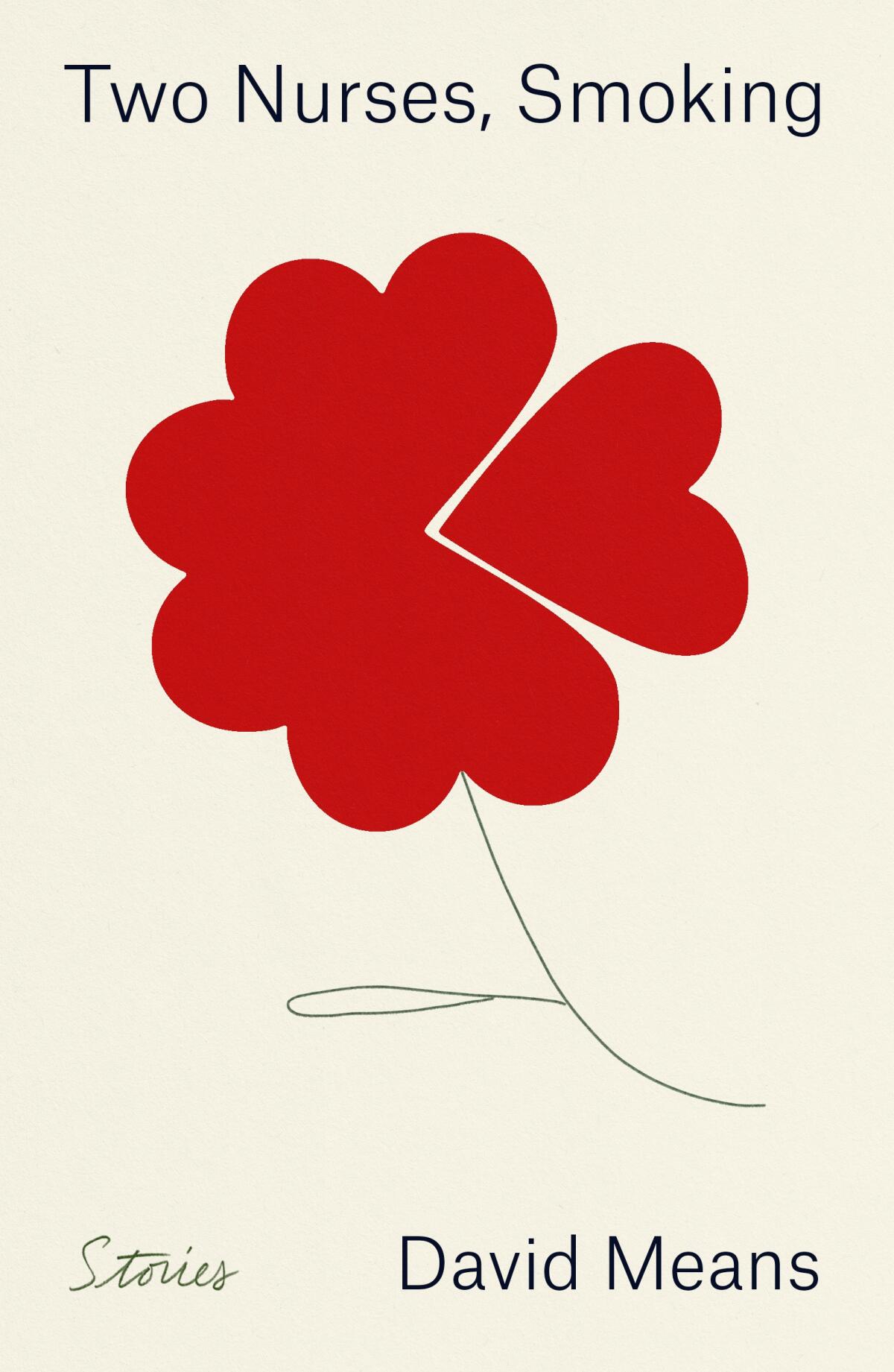Review: From sensitive dogs to flirty nurses, David Means’ stories are playful and dead serious

- Share via
On the Shelf
Two Nurses, Smoking: Stories
By David Means
FSG: 224 pages, $26
If you buy books linked on our site, The Times may earn a commission from Bookshop.org, whose fees support independent bookstores.
David Means’ sixth volume of short fiction, “Two Nurses, Smoking,” is a book of grieving. Though there is much else afoot, there’s no other way to read the 10 stories gathered here. Tragedies take place, people die. Loss is insurmountable and lasting. And yet Means’ characters also manage, generally speaking, to survive.
“When you’re living in a certain kind of loss,” the author writes in “Stopping Distance,” which begins in a support group for parents of dead children, “the only recourse is to look at events as loaded with symbolic portent, as full of signs and indicators pointing a way out of loss, or to the fact that the loss might never go away; it’s that or the sad but pure darkness and depression of no meaning at all.”
Love does not end when the object of one’s affections disappears. How do we go on? How can we persevere? Such questions sit at the center of this beautiful and complicated book.
Means has never shied from the larger issues. “You’re aware — at least I am — that eternity will devour everything in its own time,” he observes in his previous collection, “Instructions for a Funeral,” “and that whatever mark is left will be gone, because that awareness is essential to the world: a sense of catching some slice of time itself, making it stand at attention, and still.”
If “Instructions” highlighted certain motifs (the fragility of family, the fleeting edge of memory), “Two Nurses” addresses a related set of implications, perhaps most essentially that of meaning — or consolation. Means’ latest characters, many of them well-off residents of New York’s Hudson Valley, must confront the past in the form of their choices. They are trying to understand where things went wrong. “You want nothing more,” the author notes, “than a straight line away from grief. … All you want is a semblance of orderly structure in your progression back into the world.”
The idea of blown chances, of lost opportunities, looms large throughout David Means’ fourth collection of short fiction.
Means introduces his intentions via an unlikely mechanism: “Clementine, Carmelita, Dog,” which opens the book, is told through the perspective of a dachshund. Means is too smart to take that (or any) point of view for granted. He interrupts — as he will throughout these stories — with a series of authorial asides, effectively making the creator a kind of character, or at least an active presence in the narrative.
“In this account, as much as possible, dog has been translated into human,” this presence tells us, “and like any such translation, the human version is a thin, feeble approximation of what transpired in Clementine’s mind as she stood in the woods crying and hungry, old sensations overlapping with new ones.”

It’s a terrific device, effectively anticipating the limits of our suspension of disbelief and pushing the story from gimmick to something more profound. Clementine is not unfamiliar with grieving, or the dog version of it, anyway. She has noticed, near the armpit of her owner, Claire, “a scent she knew from an old friend, a lumbering gray-furred beast who was often tied up outside the coffee shop in town. It was the smell of death.” After Claire dies, her husband, Norman “began to give off his own sad odor of metal and salt,” until the morning he packs a gun before taking the morning walk on which he and the dog become separated.
If the presence of Norman’s weapon recalls Chekhov, Means knows what you’re thinking. “Once the gun was in Norman’s bag,” he insists, “it was gone from [Clementine’s] mind, completely, naturally. It wasn’t some kind of Chekhovian device that would have to, at some point, go off.” The direct address builds complicity with a reader — a set of shared assumptions that the author will go on to both develop and overturn.
More than once, Means reveals the flashpoint of a story’s ignition — as in the title piece, which revolves around two medical techs who, over a period of months, come to a tenuous intimacy. “Wait,” he writes, “before they got to the hotel they stopped at a diner, sharing a meal, and then in the parking lot they smoked and leaned back, gazing up at the stars — and if you’d been looking you would have seen them there and speculated on two people lingering in an upstate parking lot, kissing each other gently, and you would’ve extrapolated a story from that image.”
The latest from Ling Ma, Yiyun Li, Russell Banks and Namwali Serpell as well as exciting newcomers round out our critics’ most anticipated fall books.
The effect is to remind us of the contrivance of fiction. Paradoxically, this sense of metatextual play, which otherwise might distance us, is what gives Means’ narratives gravitas. “That’s how we salvage the past, locating the small stories and passing them carefully into the future,” a grieving mother confides in “Stopping Distance.” At the same time, she continues, “The story of my loss isn’t something I want to pass on. The only thing I can pass on is the silence.” This tension is echoed in “The Depletion Prompts,” which closes the collection. “The confessional tone will — if it works — shroud the fundamental truth of the story itself,” Means suggests: “that inside any confession there is always a tonal quivering of distaste and distrust, perhaps inside the reader’s mind, too.”
Is Means revealing himself with such a statement? Certainly, that’s a part of it. Yet the stories here are not games or experiments; rather, they aspire to use those tools to more traditional ends. Not unlike his characters, Means can piece together reality only by way of fragments. This is why so much of “Two Nurses, Smoking” is built out of an accretion of short scenes and sequences. It’s as if we can see the world only in passing glances, can know only so much about ourselves.
“I’m not sure how much real life can bear art and art real life,” the narrator of “I Am Andrew Wyeth!” argues, “because the two entwine themselves only up to a delicate thin line (or point) where memory, desire, and touch start to move away from each other, repelled by the present moment.” That’s the conundrum — and the necessity — of art. Who are we? Where are we? What are we doing here? None of this, Means understands, is the stuff of idle speculation; it is the most essential matter of our lives.
Ulin is the former book editor and book critic of The Times.
L.A.’s authors, from 19th century novelists to Wanda Coleman to Steph Cha, have always pushed genre boundaries and dissected California myths.
More to Read
Sign up for our Book Club newsletter
Get the latest news, events and more from the Los Angeles Times Book Club, and help us get L.A. reading and talking.
You may occasionally receive promotional content from the Los Angeles Times.









